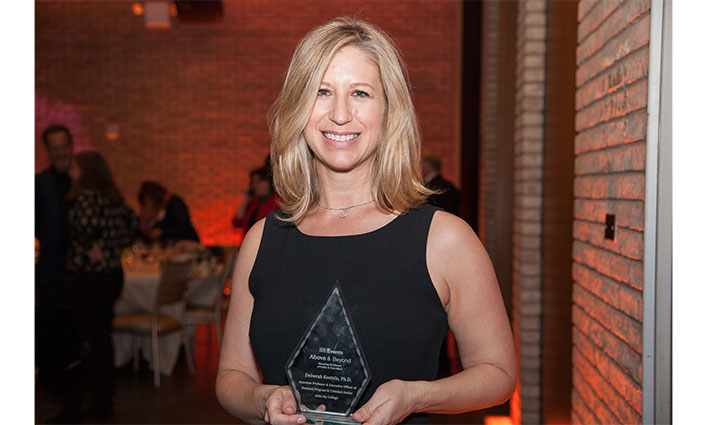
Deborah Koetzle, Ph.D., Associate Professor and the Executive Officer of the Doctoral Program in Criminal Justice, was in El Salvador working to help improve severe prison overcrowding, when she received an unexpected email from City & State New York, a media organization dedicated to covering local politics and policy. The email said that she would be one of their 30 Above & Beyond Award Honorees, recognizing extraordinary women in education, health, labor, law/lobbying, government and real estate. “I was shocked,” says Koetzle. “There are so many people here at John Jay, and elsewhere, doing such amazing work. And when you’re in the weeds, I think we sometimes forget that what we’re doing actually makes a difference. It was a huge validation that the work I’m doing really matters.”
Koetzle believes her biggest educational contributions center around her research on correctional rehabilitation and reducing recidivism. “A lot of my work focuses on identifying programs that are effective, and transferring that research to different agencies and practitioners, such as probation officers, correctional officers or drug counselors,” says Koetzle. Her research has added to a whole body of literature on recidivism, dating back to the 1980s. And some of her findings have been both eye opening and transformative for criminal justice practitioners.
“It seems counter intuitive, but we’ve found that spending your energies on high-risk offenders is actually more effective than spending your energies on low-risk offenders.”
—Deborah Koetzle
“It seems counter intuitive, but we’ve found that spending your energies on high-risk offenders is actually more effective than spending your energies on low-risk offenders,” says Koetzle. Her research shows that low-risk offenders have strong family ties, jobs and schooling that could be negatively impacted with intensive treatment. Whereas high-risk offenders, who often don’t have strong support networks, could truly benefit from decision-making and impulse-control training. “If someone is more likely to reoffend, they probably don’t have as many positive role models in their life, and there could be some deficits,” says Koetzle. “Treatment teaches them how to engage with others, celebrate without getting high, manage without drugs and alcohol, and identify positive friends and relationships. By building up these strengths, you can significantly prevent reoffending.”
In recognition of Koetzle’s work with her Ph.D. students and research fighting recidivism, on March 28, 2018, she was honored at City & State New York’s 30 Most Remarkable Women gala at the Dream Hotel. “Looking at the list of people being honored, I was awed to be a part of the event,” says Koetzle. “And also, as a woman, I hope to serve as a role model for students, showing them that women can do a lot. We all know this, but I think it’s important to see women in leadership positions, being active across a variety of settings.”



